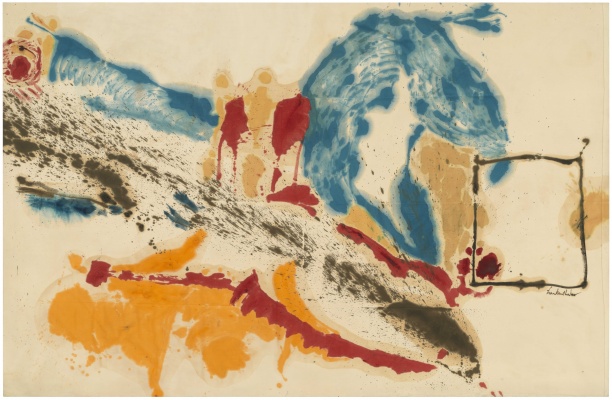Descripción de la Exposición
Kabe Contemporary Gallery in Wynwood announces the opening of the exhibition Jorge Eduardo Eielson: on the other side of languages, next March 19, 2016. The homage/exhibition gathers select works from this multifaceted artist who knew how to "knot" the most diverse disciplines in a quest that took him to the other side of languages. He was seeking a way -a musical matrix as he would say- to contain the unspeakable. Through the materiality of poems and the poetry of visual expression he encodes the mysticism of bodies, the keys to an experience of the transcendent or ultimate fulfillment of silence in the knot of life itself, which he defined as a "masterpiece".
Just as Rimbaud, Eielson (1924-2006) wrote poems that changed literature in his country before the age of 20. At 21, his book Reinos (kingdoms) earned him the National Poetry Award and triggered a poetic vanguard in the so-called "Generation of '50" which decisively contributed -as Mario Vargas Llosa put it- "to breaking down the regionalist limits of Peruvian poetry, embedding it into modernity". Having dominated the most attuned plays on language Eielson had a revelation: "To write poetry, one must forget words."
This dispossession, originating from the ultimate impossibility of verbal language, from its thirst for the absolute -he wrote that he lived in a house with doors that "opened thirstily to the stars"- led him to concrete poetry and from there, to what Sebastian Salazar called "another kingdom": visual art, created in Europe and alien to his country, not because of geographical distance, but because he belonged to another age. A future that is this present, where Peru prepares an immense exhibition that follows the path of this visionary artist that lived on the borderline between verbs and images, sounds and gestures, action and inaction, with an eschatological vocation, capable of unifying the sublime and the detritus. Eielson was seeking to hunt, beyond the last frontier of all languages, "that which speaks from afar, like the stars": that absolute something that unravels simply by trying to grasp it, and still manages to enlighten us and transform us upon contact.
Curated by Aluna Curatorial Collective (Adriana Herrera and Willy Castellanos), Jorge Eduardo Eielson: on the other side of languages, broadens landscapes ten years after his departure, in order to delve into the poetic work that we conventionally call "artistic and literary". Eielson runs through a knot of creative coordinates that are inseparable from his poetic nature: someone capable of leaving works unsigned in public places, hoping they will emanate their own radiance. "A good part of his work -writes José Ignacio Padilla- is not visible, as he made it underground, anonymous, fleeting and mundane".
Exiled from Peru due to the impossibility of being understood, many years after having held a reddish fabric woven by weavers from the Chancay pre-Columbian culture, he wanted to knot himself into the others, going beyond the body, which led him to make the cloth with which we cover bodies taut on the loom until, as Salazar Bondy writes: "The garment naturally disappeared and the colored cloth was left outstretched in different directions, creating its own sign on the smooth backdrop. The word sign merged with the idea of the knot, gave rise to the name for these works: quipus". This cording of knotted colors and fabric which he called using the name for the system that the Incas used to send messages, and to which he gave the moniker "talking knots", are intertwined with his series of knots. "Knots that swim/ In mysterious oceans/ Of nothing", he wrote in a famous poem of the same name.
Both his literary and plastic work -tridimensional paintings, installations and performances- embody, as Alejandro Tarragon would write "the tensions and distensions created by the knot and its undoing. His work is fully expressed through these intersections and denouements that breach the conventional limits of language". Surely it is a work that seeks the absolute, through a "polysemic net comprised of different codes that merge into a single language: the integration of this continuous event that is the universe".
What Jorge Eduardo Eielson wanted to say and was on the other side of languages came from an experience in which Rilke's echo rumbled: "I have dug in the deep nights". After sinking into the abyss of silence, there was a higher understanding that everything, "valleys and mountains, silent insects"- is knotted. As critic Pierre Restany, theorist of the "Nouveau Realisme" group wrote about him: "The extreme fluidity of the realm of language translates into a vital nomadism, multiform from the standpoint of expression, planetary from the standpoint of existence."
In the Paris of the late fifties, and in later years in Rome, Milan (where he would live for the rest of his life), and in other European capitals, Eielson searched for and experimented in the forefront, participating in various editions of the Venice Biennial and in important expositions such as "Plans and Projects as Arts" (Kunstalle Gallery, Bern, Switzerland, 1969), the "birth certificate of Conceptual Art", according to Pierre Restany.
Comprised of nomadic languages, poetry from various ages intersecting with works from his renowned series Knots (the physical attribute of the universe and the philosophical/compositional core of his expressive quest), and Quipus (reinterpretations of the mnemonic system of the Pre Hispanic cultures of Perú), the Jorge Eduardo Eielson: on the other side of languages exhibition will run until May 6, and can be visited from Tuesday to Friday, 11 AM to 5 PM.

Exposición. 11 abr de 2025 - 28 sep de 2025 / Museo Guggenheim Bilbao / Bilbao, Vizcaya, España

Formación. 08 may de 2025 - 17 may de 2025 / Museo Nacional Centro de Arte Reina Sofía (MNCARS) / Madrid, España